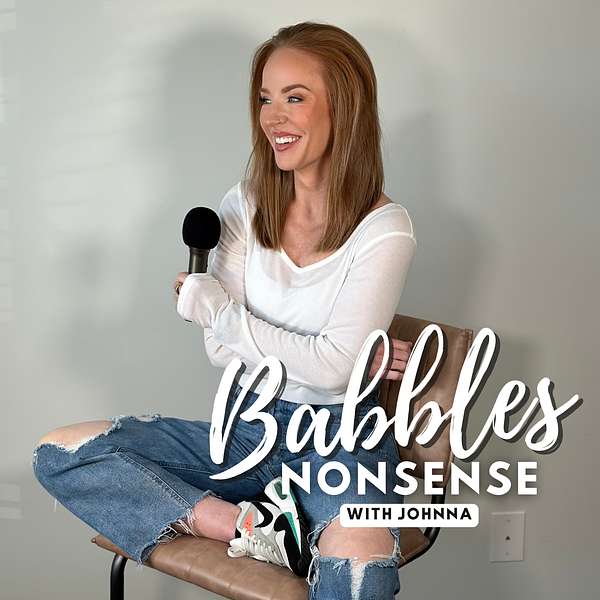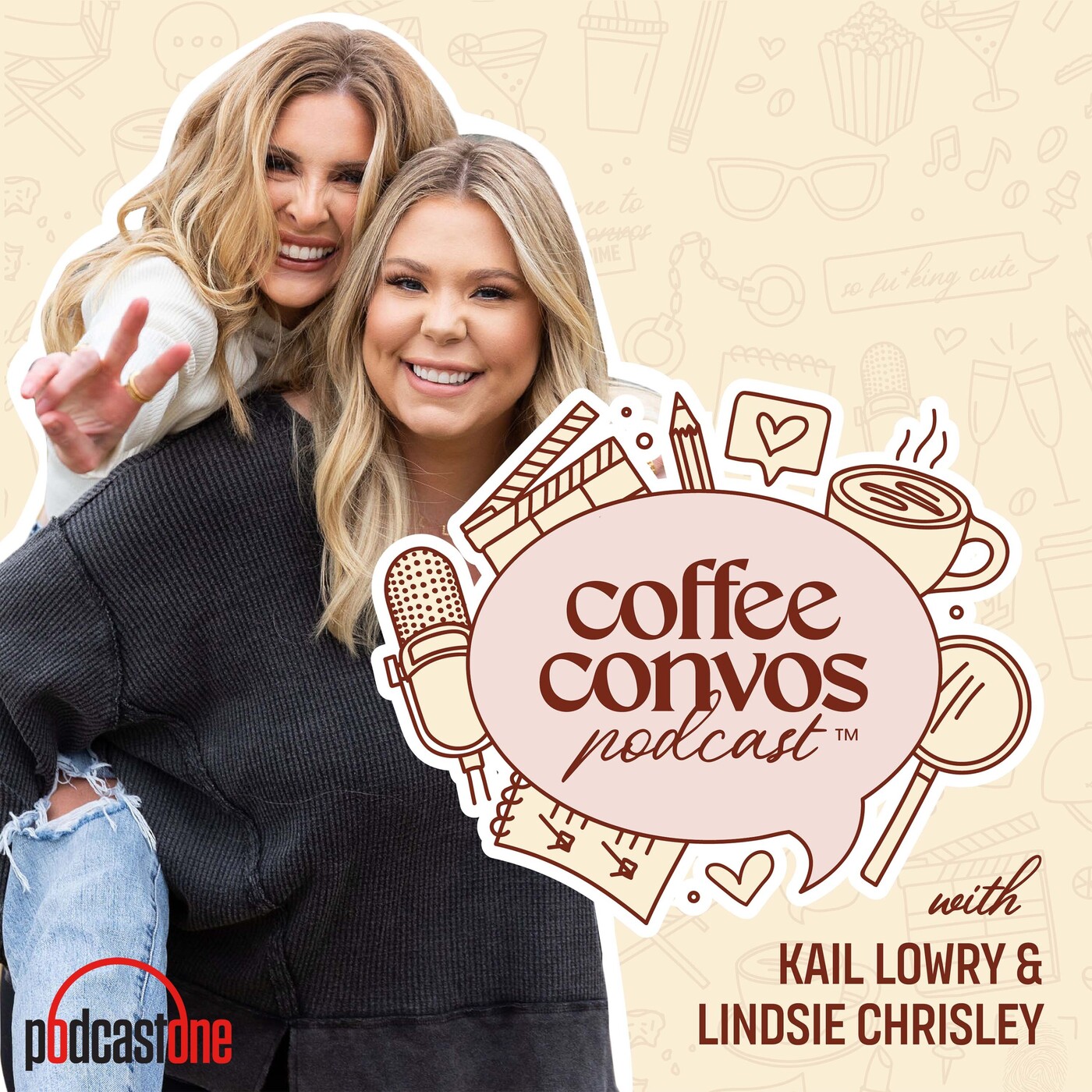
Babbles Nonsense
Welcome to my verbal diary where I want to discuss any and all things that is essentially on my mind or have wondered about. Sometimes I will be solo and then other times I will have some amazing guests to bring all different perspectives in life. The ultimate goal is to hopefully bring some joy, laughter, inspiration, education, and just maybe a little bit of entertainment. Don't forget to like, rate, and share the podcast with a friend!
Babbles Nonsense
Babbling About… When Confidence Gets You Labeled (and Wearing It Like a Crown)
#185: That moment when the room falls silent after you've spoken up—not because you're wrong, but because you dared to say something. You've just stepped into that familiar territory where advocating for yourself or others gets you labeled as "difficult," while others receive praise for the exact same behavior.
This frustrating double standard isn't just in your head. Harvard Business Review research confirms that 66% of women receive negative personality descriptors in performance reviews when they speak up, with words like "abrasive" and "difficult" appearing far more frequently than in men's reviews. Columbia Business School found that when women are assertive, their likability drops significantly, while men's remains unchanged. We're constantly navigating an impossible tightrope: be warm but not strong enough for leadership, or be direct but "unlikable."
The calculation is exhausting—how do I speak my truth without being seen as "too much"? But remaining silent is equally damaging, reinforcing inequities and teaching others you'll tolerate imbalance. Every social advancement throughout history came because someone was willing to be labeled difficult. From women's suffrage to workplace protections, progress happens when people speak uncomfortable truths.
You can advocate effectively by leading with facts, using "we" framing instead of "I need," practicing neutral delivery, and knowing which battles deserve your energy. Set boundaries early rather than letting resentment build, and surround yourself with people who value directness rather than trying to convince others your personality is worthwhile.
If speaking up makes you "difficult," then perhaps more of us should embrace being difficult together. Workplaces, relationships, and societies don't improve because everyone stayed comfortable—they change because someone had the courage to say "this isn't working" and advocate for better. The next time someone calls you difficult, consider that they might actually be telling you that you're doing something right.
You can now send us a text to ask a question or review the show. We would love to hear from you!
Follow me on social: https://www.instagram.com/babbles_nonsense/
Welcome back to another episode of the Babbles Nonsense podcast. On this week's episode, I do have a question for you. Have you ever spoken up whether that be at work, in a relationship or in a friendship and just felt the energy in the room shift, not because you were wrong, but because you weren't quiet about it? To me, that's such an odd phenomenon you point out a problem, may even offer a solution, and then suddenly the focus isn't on the issue anymore, it's on you. You're considered complaining, you're making things difficult or you're too much. I've noticed that when men do this, they're often called leaders, assertive or even attractive, but when women do it, we're called bitchy, complainers or even difficult. But this isn't a men versus women conversation. That's just an example of how speaking up can be perceived. This episode is about standing confident when you stand up for yourself and for what's right, even when it makes people uncomfortable. So let jump straight into it. Today we're talking about that double standard I just mentioned in the intro, the one that tells women to be strong but not too strong, be confident but not intimidating, be direct but not difficult.
Speaker 1:This has happened to me far too often, because I learned at a young age that I had to stand up for myself or who was going to do it. It also stems from a lot of childhood trauma that I'm, you know. Obviously I feel like childhood trauma we're always going to be working through. It's not an excuse, it's just like that's so deep subconsciously and I'll just have to. I mean, y'all heard several podcasts with me and me and you, about how deep the subconscious goes. But, with that said, like all, all of this that I'm talking about is stemming from some childhood trauma where I didn't stand up for myself as a child and I just accepted verbal and physical abuse from people that should have just really cared about me and loved me. Y'all know I've talked about my you know that being my sister, so I have always worn this mask. I feel like in my professional life I have always worn this mask. I feel like in my professional life Because, well, I guess it's not necessarily a mask. I don't know where the mask goes. Is it my personal life or is it my professional life? Because in my personal life, growing up with all this childhood trauma and not knowing like standing up for myself, and then it took years and years and years, and I'm I was one of those people probably still could be one of these people that I would let things just constantly build and I would just be like, okay, okay, okay. And then all of a sudden, one thing happens and I'm exploding right and someone's like where's this coming from? Because it may be something little as you know the saying the straw that broke the camel's back like it wasn't that one thing, it was just over time, several things that built up and I would explode.
Speaker 1:So, through therapy and life coaching and things like that, I had tried to start working on that and expressing things right then and like talking about it then and doing it in a professional and respectful way, whether that be at work or in my personal life. But I noticed that I started to be labeled quote unquote difficult and I was always curious why, like it used to really bother me. It used to really bother me when people would be like you're just difficult. And then, as I've talked to my Aunt, debbie, whom I've mentioned on this podcast several times, who really should be a therapist but unfortunately she's not. She's my free therapist. I guess I don't know if she loves that, but she and I would talk about this and I think she used the example like a martyr, like how does she say it? Because I'm going to definitely butcher this. She would say, like martyrs, don't have an easy life. And she was like I'm by no means calling you a martyr. She was like, but think about it. Like have an easy life. And she was like I'm by no means calling you a martyr. She was like, but think about it, like we wouldn't have the things we have in life, like social justice and gender equality and things like that, if people didn't stand up. And that probably was not easy, well, it was not easy for them to do either, but they did it because it was the right thing to do.
Speaker 1:And so and I'm not trying to put myself in that category, I'm just saying like, when I do see injustices being played out, whether that be in my personal or professional life, I tend to stand up for things and I tend to speak out, maybe even when it's not even about myself, which again labels me as quote unquote being difficult. So I'm going to kind of start with some of my own experiences and then I want to kind of dive into the research that proves that it's not just in my head or made up, because for a long time I was like maybe I am I fed into it, maybe I believed it. But as I have worked through therapy and as I have grown to appreciate my personality, I have become stronger and confident in what I am doing. And I appreciate that Because, again, if somebody doesn't do it, who's going to? How are we going to make changes or headways in our, in our own lives or in a professional career, if someone doesn't start making those headways? So we're going to kind of talk about why it happens, what it costs us and how to push back without burning ourselves out.
Speaker 1:So kind of want to dive into why this can, why this podcast topic came up. It's because you know there's a current situation at work that had happened. And then I started thinking about my previous jobs where I had noticed imbalances in workloads, policies not applying to all, and then you know favoritism, etc. Whatever you want to put into it, like if you're thinking about your own career, and that kind of thing, in my opinion, if I left it alone, was going to keep happening. And I know sometimes they say like don't stick your nose in where it doesn't belong.
Speaker 1:But those kind of things are the justice that I'm talking about, like if it's not applying to everyone, which I also understand that the life is not fair, the world is not fair, so I tend to be the person that doesn't stay quiet about it. I tend to attempt to bring it up to people, whether that be my friends or administration at work, like I said, in a professional and respectful way. I would try to explain the numbers. The policies provide examples of inconsistencies, but I would try to explain the numbers. The policies provide examples of inconsistencies, but I always tried to also offer solutions because, again, my aunt, whom I get advice from, always told me to not complain without a solution. I did all the things that I was told to do when addressing issues constructively, professionally and politely. But, with that being said, don't get me wrong.
Speaker 1:Like early in my career, when I first started doing all of this and like trying to stand up for myself, I didn't go about it in the best way. I had to learn through years of experiences and you know therapy and talking to my aunt and all that on how to advocate for myself, and I think I've gotten better at it. I think I've. You know, am I perfect at it? No. Will I continue to work at this my entire life?
Speaker 1:Yes, but when I would advocate for myself or when I do not win, but when I do advocate for myself, usually the reaction is well, you know, it's never. It's never about what I'm talking about, whether that be about the numbers, the rules, the policy, it was never thanks for pointing that out. It always tended to shift back towards why I was bringing it up or why, like, why did you have to bring that up? Because, honestly, if everybody just stayed silent and I didn't bring it up, then everything was all good right. That tone seemed to shift back towards me and I could feel that subtle implication that by bringing it up at all, I was being quote, unquote, difficult, and maybe that was never the intention, but that was my perception and I always thought, you know, cause, just me being a female in the workplace, I always had these thoughts like I wonder, if a man in the same role had said the same exact words in the same exact tone, would the response have been the same? Or would have it? Would have it been he's a go getter, he's looking out for the team.
Speaker 1:So I always, you know, have these conversations, like I said, with my aunt and I Just so you know, like her background is, she has a long standing career in administration and so that's why I talked to her when it comes to work things and I mean, obviously I talked to her about my personal life as well, because she gives great life advice and I definitely admire her and the work and the path that she's paved in her own career, and I would love to be like her, like I would strive to be like her, and she had to help me realize that maybe this wasn't just my imagination, this was real, because she would give me, you know, examples of her career and how she would do the same thing. She would stand up for things and fight for things at her workforce and she, you know, built a great physical therapy department at the Mayo Clinic when she was working and how things you know went and stuff like that, and she was very proud of it. But the difference between her and I is it took me a long time like I'm two years away from 40 almost and I am just now becoming a little bit more confident in my personality, where she's always been confident in her personality. But again, childhood trauma is different in everybody. But going back to what I was talking about.
Speaker 1:I did do a little digging and some research through ChatGPT, because it's just the easiest way to do research these days, and I did find a study from Harvard Business Review that found that 66% of women are more likely to be described with negative personality attributes in performance reviews compared to men. Words like abrasive, emotional or difficult show up far more often when we speak up, when women speak up. The Columbia Business School did another study when women are assertive, their likability drops, and that's and this isn't in the study, but I have found that to be true in my personal life as well. When men are assertive, their likability doesn't change. It's really just a double standard. And if you're warm and agreeable, you're seen as nice but maybe not strong enough for leadership. If you're direct and assertive, you're competent but unlikable. And here's the kicker Men who advocate for themselves are often rewarded.
Speaker 1:Women who do it were told to be more collaborative, which is often code for quote unquote. Stop making people feel uncomfortable, and I honestly, I started seeing this in every part of my life. Like you can literally just get on TikTok and look up dating advice and there are 1000s of men telling, telling women. The one turnoff about women is that if they're too hyper independent or, you know, advocate, basically advocating for themselves or like disagreeing, or it just comes across as being difficult to men, and I do get it, because that puts women more in their masculine energy. But at the same time, how are women supposed to stay in their feminine energy, advocate for themselves, their careers and try to get ahead in life, especially in a society that we're in? We're no longer in a society where we depend on men for finances and whatever it may be, so we still have to be able to do what we can do for ourselves. But then how do you turn that off? And maybe there is a way. Maybe I need to talk about talk, talk to me and you about this and get her advice.
Speaker 1:But for me, like this constant calculation that we do, how do I say this without being seen as too much? It's exhausting and honestly I feel like it chips away at our confidence at the end of the day, because people want to put labels on it all the time. You start to second guess yourself Is it me? Am I overreacting? Should I have said nothing? And that's exactly how biases keep themselves alive. It makes you doubt your own right to speak up emotional and corporate gaslighting, if you ask me.
Speaker 1:But here's the thing Remaining silent also eats away at you. It doesn't seem to align with what you want to make of yourselves or your life. It'll definitely, and it definitely doesn't protect you in any way. It just keeps the imbalance in place and it teaches everyone around you that you'll tolerate it, you'll accept the work, you'll do it. You won't say anything because you don't want to be labeled quote unquote difficult. So what if we flipped it? What if being called quote unquote difficult was a sign you were actually holding the line, protecting your energy and advocating for fairness, and that you were getting one step closer to a breakthrough?
Speaker 1:In fact, the McKinsey women in the workplace report found that women who are vocal about inequities, even if they get pushback, often improve conditions for their team over time. And, like I said, we have to go back to thinking about the women who fought for the right to vote to be able to divorce their husbands. Because, yes, ladies, men used to be the only ones who could ask for or approve a divorce, and that was not that long ago. Don't quote me on this, because I didn't look it up and I should have, but I want to say that women were not allowed to divorce their husbands until, I think, the 1950s, but I'll fact check that. So if those women didn't speak up, if they weren't called difficult, if they didn't advocate for themselves, where would we be today, in 2025?
Speaker 1:And I have to continue to remind myself of that when I start getting down on myself, when, when I start thinking that this is a negative attribute, because I've also noticed, like, going back to the like, if you're quiet, if you and this is again personal or professional if you're quiet or if you don't like confrontation or you're not confrontational at all or you don't speak up for yourself, then that personality seems to be more positive and people kind of gravitate more towards that than someone who's more vocal or someone who is willing to talk about situations that bother them, because it's seen as confrontation, even though it's not really confrontation. In my opinion, you're just trying to talk about a situation, to learn about it, grow, fix it. That seems to be more of a negative personality trait. So the one with the negative personality trait is always asked to like tone it down, don't ask so many questions, don't be like that, just keep quiet. But the person who's quiet, or maybe they're emotional, maybe they get their feelings hurt a little bit. They're never asked to. You know, speak up a little bit more, toughen up. You know, maybe maybe it's both. Maybe we should ask the person who is a little bit more loud and a little bit more vocal to tone it back a little bit and the person who doesn't to tone it up a little bit and let's meet somewhere in the middle. But you know, obviously this is not a perfect world and that's probably not going to happen. But if you've ever found yourself like in this position, whether it be personal or professional, here are a few ways to advocate for yourself. So if we're talking professional, we can always lead with facts. Data makes biases harder to dismiss and my aunt has always talked to me about that.
Speaker 1:Take the emotion out of it. Only speak facts, document patterns, not as ammunition but as clarity, like to show and to prove. This does continue to happen over time. And then we have to use we framing. We all benefit when, instead of I need, which is kind of like when they tell you to take you out of it, like don't put you in your emails. We have to stop taking I out of things and saying this would be beneficial for all, because that's what we're trying to do. That's the goal is to make it beneficial for all. We also have to practice neutral delivery. We can stay firm without giving any tone to our emails, and that's something that you know.
Speaker 1:When I was talking about my earlier career, I would keep emotion in it and I wouldn't take it out. And now I will write my email when I am emotional, set it to the side, go back through it, the use, take out the eyes and take out any of the emotional words and then just straight talk facts, and I'm talking about like as simple as this happened at nine o'clock. This happened at 10 o'clock, this is how many patients. Facts, because no one can dispute or argue facts. And then you also have to know when to disengage, because not every battle is worth your energy, but the big ones are. And that's something that I am currently still working through is that I still am trying to fight these little battles that really probably don't amount to anything. And then I'm not thinking about the bigger picture, because when you do continue to fight these battles and someone has labeled you as difficult it's really hard to be heard when it really is important.
Speaker 1:But in life and relationships, we can choose where we put our energy. Not every comment or criticism needs a response, and that's something that one day, hopefully, will get into my head. I'm consistently thinking I always have to respond, whether good or bad, when sometimes you don't have to respond and people can get the hint. We also can set boundaries early. Don't wait until resentment builds, and that's something that I was talking about. How I used to do that when I was younger. I would be like, okay, okay, okay, and then it just kept stacking and stacking and stacking until boom, explosion. So then I started being like, okay, we have to start talking about things in real time, no matter how uncomfortable it is. And that's why people will be like you. Just, you like confrontation. No, it's not that I'd like confrontation, I just it's very uncomfortable for me to confront someone, but you truly don't want to see what happens when I explode. So, trust me, you're you would thank me if you knew.
Speaker 1:And then we have to realize that aligning with people like we need to align with people who value our directness and we shouldn't have to convince someone it's a good thing. And that, again, is something I'm working through, because I used to beat myself up about my personality and I think it was that I was just trying to fit in with people that I didn't align with and that people that didn't appreciate it, and that because I appreciate directness, I appreciate friends that are direct. And I'll give you an example, just talking personal If I put on an outfit and I asked my girlfriend, hey, do you like this? And she tells me yes, and then we go out and everybody's like, why would you wear that? Why would your friend just not tell you like hey, girl, no, it's not cute, it's not as cute as you thought in your head, go change Like. Obviously we can do it with compassion and we don't have to do it like rudely or hateful, because there's a difference in directness and bluntness, and that's something I also had to learn.
Speaker 1:But anyways, another thing we can do is don't shrink to fit in. If you have to dim your light to make someone else comfortable, then that's not your person, that's not your friend, that's not your romantic partner, and that's something that I would consistently do because, for example, in dating because I do, you know, have a great career, I'm professional some men that I've dated in the past did not like that I made more money than them and I understand that that's a thing, but and I would try to like dumb it down, like I would try to say, oh, I'm just a nurse or oh, I'm just this, just to dumb down my career to make someone else feel comfortable. So I've learned to stop doing that as well. And then the last thing we can do is balance independence with openness. Show that you can do things on your own, but you're still open to help, connect and have partnership. And that goes back to like when I was talking about relationships and a lot of men on TikTok giving advice, saying that a lot of men find it unattractive that women are super hyper independent.
Speaker 1:I think there is a balance between being independent because, like, for example, I'm a single female, I have to do a lot of things by myself. So when someone does come in and they want to help, because of my past experiences, I'm like, okay, what do you want? And to know I can do it myself, but I'm having to learn to allow people to help me. And it's kind of crazy because I am in the healthcare field and in the nursing field and you would think being in that field would teach you like we all need help, because that's a career that you cannot do everything by yourself. But I'm telling you, as nurses ask any nurse there's a saying they eat their young and that's because they will let you drown and watch you drown before helping you, knowing that this field is so hard and needs help. But anyways, with all that being said, with everything that I just said, I want to just say if speaking up makes me difficult, then I hope more of us choose to be difficult together.
Speaker 1:It used to really bother me when people labeled me this way, but the truth is I do know my heart, I know what's right, I know my intentions and I'll continue being me, with my held held high and allowing the right people to gravitate toward me, because the truth is workplaces, relationships, friendships and life don't change because everyone stayed comfortable.
Speaker 1:It changes because someone said this isn't working and we need to do better. So the next time someone calls you difficult, just remember they might actually be telling you that you're doing something right. So thank you all for listening to this episode. I know I babbled on, but if this resonated with you or you know a friend struggling with the same thing, obviously share this episode with them. And if you have your own story you know I love when y'all tell me stories or if you need me to do a sequel or get me and you on to talk about this more in depth willing to do that too just shoot me a message, email, dm. I would always love to hear your experiences. But anyways, guys, until next time, bye you.
Podcasts we love
Check out these other fine podcasts recommended by us, not an algorithm.

The Skinny Confidential Him And Her Show
Lauryn Bosstick and Michael Bosstick / Dear Media
Untraditionally Lala
iHeartPodcasts
Disrespectfully
Katie Maloney, Dayna Kathan
In Your Head with Chris Medina
In Your Head with Chris Medina
Not Skinny But Not Fat
Dear Media, Amanda Hirsch
Stassi
PodcastOne

